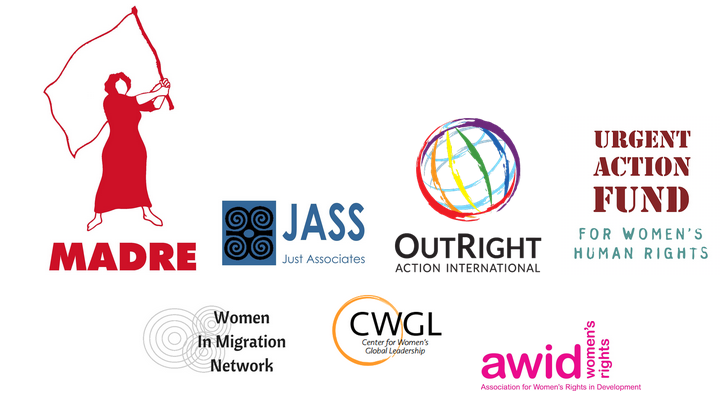Dear Members of the UN Commission on the Status of Women,
We the undersigned organizations write to express our deep concerns about the latest restrictions on civil society participation at the 2017 UN Commission on the Status of Women (CSW) meetings. This year's CSW is taking place under the shadow of the United States’ escalated anti-immigrant, anti-refugee, and anti-Muslim policies, which are preventing some women from exercising their right to political participation at UN Headquarters in New York. The policies represent the latest in a long history of restrictive migration, refugee and asylum measures that subject women and their families to hate crimes, detention, deportation and family separation, while undermining core universal human rights regarding migrant and refugee rights, and worker protections.
These circumstances emphasize the urgent need for women facing multiple discriminations to be at the center of conversations on human rights at CSW.
These restrictions on civil society participation are part of a much broader threat, not only to CSW, but also to the very foundations of multi-lateral cooperation, the rule of law and human rights. Governments across all continents have adopted laws and policies curtailing civil society participation in democratic spaces, making international space an even more critical site for civil society to confront and hold governments accountable. Civil society access to these spaces is necessary for the advancement of all human rights, including rights that ensure women’s economic empowerment in the changing world of work. It is also necessary for the work of the UN.
The new UN Secretary General, António Guterres, has affirmed that “civil society is a key instrument for the success of today’s UN,” and that “dialogue and cooperation with civil society will…be a central aspect of the activities of the UN in the next few years.”
For that to happen, civil society needs access to the UN, without discrimination on the basis of nationality, religion, income, migration status, or any other factor.
The latest obstacles to civil society participation at New York’s UN Headquarters will likely extend beyond this year’s CSW.
Access to future CSW sessions, and to all UN decision-making spaces, including the Security Council and General Assembly, is also threatened. Year round, women and other gender justice advocates participate in critical convenings at UN Headquarters, including during the Permanent Forum on Indigenous Issues in May, the Open Debate on Women, Peace and Security in October, negotiations for a new Global Compact on Refugees and a Global Compact on migration, International Day of Persons with Disabilities, and LGBTIQ advocacy week in December. It is in New York that civil society advocates from across the globe engage with the world’s governments in order to shape national and international priorities.
Maintaining access for civil society, particularly women’s human rights defenders, to UN decision-making spaces is essential to the empowerment of women as envisioned in the Beijing Declaration and Platform for Action and the gender-responsive realization of the 2030 Agenda for Sustainable Development. To this end, we respectfully request the Commission add the following paragraph to the draft Agreed Conclusions for CSW’s 61st session, calling on governments to remove all barriers that directly and indirectly inhibit women’s full, equal, and effective participation in decision-making at all levels:
- The Commission calls upon Governments to support civil society access to the CSW and all UN decision-making spaces, recognizing that meaningful civil society participation is critical for increasing protections and advancements for women’s economic empowerment in the changing world of work.
Sincerely,

To add your organization's name to this letter, email csw61advocacy@madre.org.
